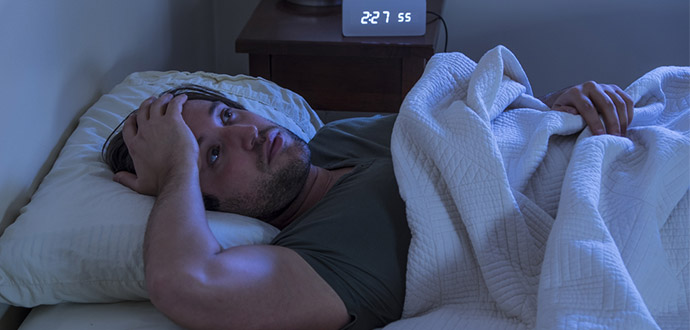
Sleeplessness regularly affects people of all backgrounds and ages, but how do you know if your sleeplessness symptoms are a normal occurrence or a sign of something more serious?
Chronic sleeplessness can cause serious mental and physical health issues, and sleep anxiety makes restless nights even more difficult to bear. To determine the severity of your sleeplessness, it’s important to understand the symptoms of sleeplessness and the root causes of your trouble sleeping.
What is Sleeplessness?
The National Sleep Foundation provides this sleeping disorder definition for sleeplessness: a difficulty in falling asleep or staying asleep, which is considered to be a chronic condition if it happens at least three nights per week for three months or longer.1
What Causes Sleeplessness?
Quite a few different things can be attributed as causes of sleeplessness, and multiple factors are often to blame for sleepless nights. Some sleeplessness causes are things that we bring on ourselves through bad habits and overexertion. However, other causes of sleeplessness are directly related to serious medical conditions and can be side effects of medications taken to control those conditions.
These are some of the most common causes of sleeplessness.1,4
- Excess stress
- Sleep anxiety
- Depression
- Chronic pain
- Breathing problems
- Acid reflux disease
- Bad sleep habits
- Changes in work or travel schedules
- Tobacco and alcohol
- Caffeinated beverages
- Snacking right before bed
Signs and Symptoms of Sleeplessness
Similarly, there are many different symptoms of sleeplessness, some of which are due to medical conditions and others due to lifestyle habits. You may have sleeplessness if you are experiencing the following sleeplessness symptoms: 1,4,7
- Trouble falling asleep
- Waking up in the middle of the night
- Waking up feeling exhausted
- Feelings of fatigue and low energy throughout the day
- Difficulty focusing or maintaining concentration at work or school
- Mood swings and irritability
- Trouble controlling emotions
- Impulsive tendencies
Possible Sleeplessness Treatment: Finding Relief
How you decide to treat your sleeplessness should be determined by the duration and the severity of the sleeplessness symptoms. It’s also a good idea to seriously consider how much sleeplessness is affecting your daily life and what else may have changed in your life to cause these issues. A primary care physician may be able to recommend a suitable sleeplessness treatment, and sleep clinics can offer specialized treatment options for sleeplessness relief as well.
These are some of the recommended sleeplessness treatments that you may consider to start sleeping better. If you have difficulty falling asleep on a regular basis, discuss these sleeplessness relief options with your doctor.6
- Prescription medications
- Over the counter sleep aids, including those containing melatonin such as NiteThru Advanced Sleep Aid 2,3
- Lifestyle changes, such as adopting a regular sleep schedule and avoiding alcohol
- Exercise regularly, at least five hours before bedtime
- Relaxation techniques, such as deep breathing exercises and meditation
- Light therapy
- Cognitive behavioral therapy
References
- National Sleep Foundation. Insomnia. Retrieved on December 23, 2018 from https://www.sleepfoundation.org/insomnia/sleep-disorders-problems/insomnia/symptoms
- Johns Hopkins Medicine. Melatonin for sleep: Does it work? Retrieved December 11, 2018 from https://www.hopkinsmedicine.org/health/healthy-sleep/sleep-science/melatonin-for-sleep-does-it-work
- National Institutes of Health. Melatonin: In Depth. Retrieved December 13, 2018 from https://nccih.nih.gov/health/melatonin
- Mayo Clinic. Insomnia. Retrieved December 23, 2018 from https://www.mayoclinic.org/diseases-conditions/insomnia/symptoms-causes/syc-20355167
- Cleveland Clinic. Common Sleep Disorders. Retrieved December 23, 2018 from https://my.clevelandclinic.org/health/articles/11429-common-sleep-disorders
- Sleep Education. Healthy Sleep Habits. (February 9, 2017). Retrieved December 11, 2018 from http://sleepeducation.org/essentials-in-sleep/healthy-sleep-habits
- Johns Hopkins Medicine. The Effects of Sleep Deprivation. Retrieved December 13, 2018 from https://www.hopkinsmedicine.org/health/healthy-sleep/health-risks/the-effects-of-sleep-deprivation